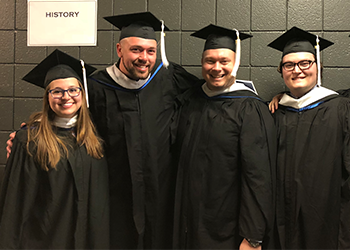The doctoral program has four major thematic areas in which students focus on a geographical region and chronological era supported by department faculty:
- American Cultures and Societies
- Empire and Decolonization
- Race, Ethnicity and Gender
- Historical Memory
For an extensive History Ph.D. course work guide, please visit the Marquette Bulletin.
In consultation with their major supervising professor and the director of graduate studies, students design subfields within these four specializations drawing on expertise across the department. These subfields necessarily are transnational in scope, but likely have a basis in the historiography of a specific region and time period so that each student has three subfields (e.g., American Cultures and Societies could include a regional and chronological focus in Colonial/Early U.S. history, but include further subfields in Colonial Latin America and the history of race).
A qualifying examination, with both written (9 hours) and oral (2 hours) components, is taken in the student’s area of specialization. A committee of three examiners will assess geographical and chronological knowledge appropriate for the proposed research area, as well as thematic and historiographical depth in the specialization. The oral component of the examination may also address the student's dissertation research.
The doctoral student also fulfills requirements for their research field and for career diversity discernment as delineated in department guidelines and are subject to the approval of the Graduate Committee.
Ph.D. Resources
The Doctor of Philosophy program requires the completion of:
- A total of sixty credit hours beyond the bachelor's degree*
- A demonstrated proficiency in a foreign language
- Passing the Doctoral Qualifying Examination (DQE)
- The successful defense of a dissertation.
* The sixty hours does not include the twelve hours of dissertation credits required by the graduate school (for which students normally register after successful completion of comprehensive examinations). Students entering with an M.A. in hand must complete thirty hours (not including dissertation credits). NOTE: Students whose M.A. is not in history may be asked to take additional courses before taking their DQEs.
The Director of Graduate Studies (DGS) will review the student's progress toward the degree annually. Each student accompanied by a faculty member (generally the dissertation advisor) will meet with the DGS. Significant academic problems will be brought to the attention of the Graduate Committee, which may advise either rescinding financial aid or removing the student from the program.
Ph.D. Coursework and Research Seminars
Ph.D. students must take two 6000-level research seminars (this includes students who received their M.A.s at Marquette ) as well as HIST 8960, a three-credit dissertation seminar (see below). The recommended sequence calls for a research seminar during the first and third semesters of doctoral course work and the dissertation seminar during the second semester.
In addition, Ph.D. students are strongly encouraged to take the pertinent colloquia (courses numbered between HIST 6110-6250), which provide introductions to the history and historiography of the periods covered by the examination fields and offer guides to additional reading and study. HIST 6100 is required for all doctoral students who did not earn an MA from Marquette.
For an extensive Ph.D. course work guide, please visit the Marquette Bulletin.
Doctoral Qualifying Examination
Students will be examined in their field (European or US) by a committee chosen by the student in consultation with the chair of the committee (who normally will also serve as dissertation director). The responsibility of scheduling the examinations lies with each student, who must consult with committee members several months in advance regarding the dates for the written and oral examinations.
The doctoral qualifying examination (DQE) will cover either European (early modern and modern) or United States History (from exploration and settlement to the present). The entire three committee of three department members assesses examination performance on the complete exam (written and oral components). Written qualifying examinations are nine hours in duration. Oral qualifying examinations, two hours in duration, are held about ten days after the written examinations. These exams may include discussion of the student's planned dissertation research as well as their preparations for their Global teaching field. A unanimous vote is required to pass the exam.
To aid in preparation, all Ph.D. students will be provided with a “core” reading list for their major field when they enter the program. These lists will be created by the Americanist and the Europeanist caucuses and may be revised every two years. Individual members of committees may suggest additional readings. They will be expected to master the field by working through this list and through coursework; all subjects and questions are on the table. In September of a Ph.D. students third semester, they will be tested orally on their major field to determine their progress in preparing for exams.
Foreign Language Requirement
The Ph.D. also requires reading knowledge of one foreign language, which can be fulfilled within the Department of Foreign Languages or by a faculty member in the history department. (For students entering with an M.A. and desiring study in Continental European history, this competence must be established by the end of the first semester of course work beyond the M.A.) Classes designed to help students prepare for the examinations in French, German, Spanish, and Latin are regularly offered by the Department of Foreign Languages. These courses (numbered FOLA 6204) are taken for three hours credit; earning at least a B grade in the course is another way of fulfilling the language requirement. Students who choose to be tested by a History faculty member must arrange to take the test with that professor, who will determine when the student is ready to be tested. Students can be tested in a single language no more than twice each semester.
The dissertation director may require a doctoral student to show competence in a second foreign language or in statistical methods when the dissertation topic requires it.


